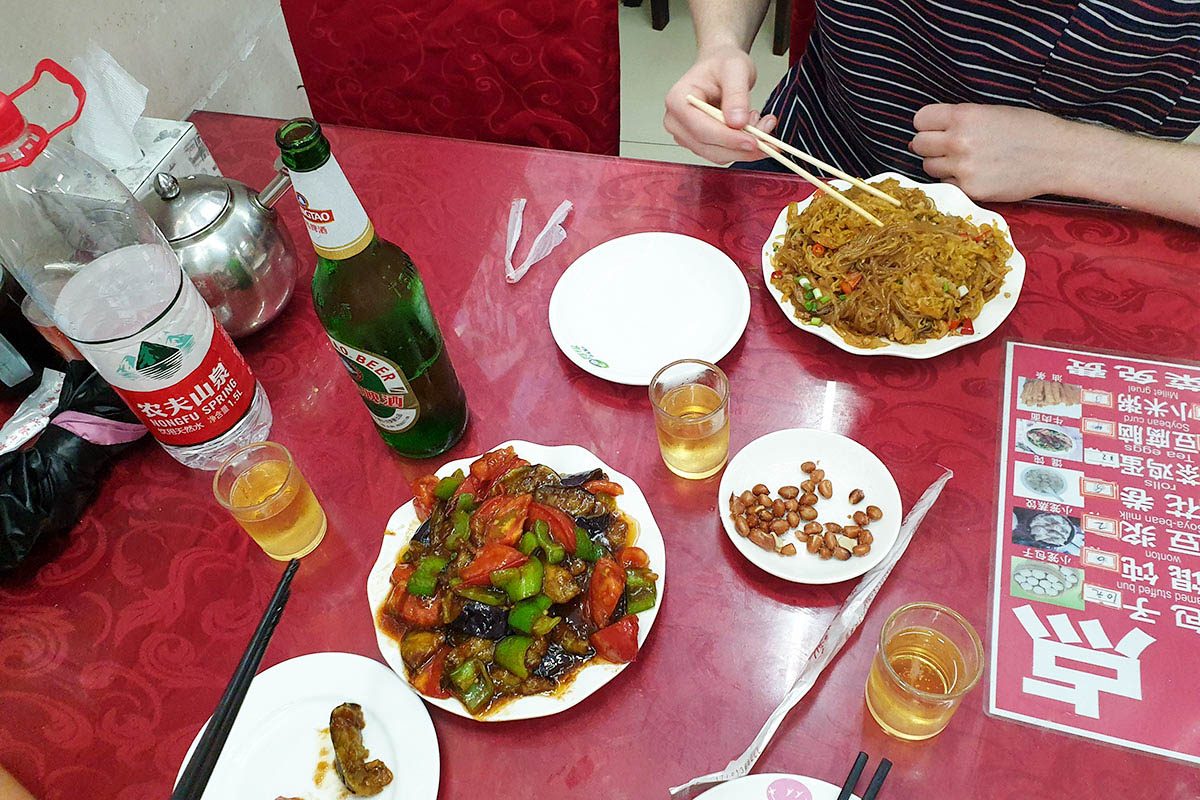China is many things. Crazy, overwhelming and unique are all words that could be used to describe this Asian country. Solo travel in China can seem pretty daunting – it’s often near impossible to know exactly what is going on while exploring the country, especially if you have little grasp of the language.
If you’re thinking about solo travel in China, you may have some concerns for your safety in this enigmatic country. Rest assured – one thing that China isn’t is dangerous. Actually, throughout all of the times I have been in this country (four now!), I have never felt my safety questioned or threatened once.
Considering that I travelled some tremendous distances (including a 44 hour train journey!) and have spent most of my time alone in the country, this is an enormous credit to the safety of the country.
There isn’t really that much difference between travelling as a solo male or female in China; the crime rate is so low that women just aren’t threatened, and there is less of a ‘chauvanistic’ culture than there is in the UK. I have never been harassed or catcalled in China; and sadly this still happens weekly back home in London.
So, if you want to solo travel in China, don’t worry – you’re going to be perfectly safe. The local people are some of the kindest I’ve ever met, and I always felt watched over and looked after by whoever was around me. Travelling in China is safe.
BUT, safe doesn’t always mean easy. And China is not easy. But it is so worth it.
What Makes China Such a Challenging Place to Travel?
So, if China is so safe, why is it such a difficult travellers’ destination, and why is it still relatively unexplored by backpackers? There’s a few reasons why so few backpackers venture to China on their Asia trips.
The Language
The language barrier is there, and it’s intense. Chinese couldn’t be further from European languages and the way that it is written makes it an incredibly complex one to master. While it’s entirely possible to learn Chinese if you’ve got a spare few years, being able to converse after one China trip might be difficult.
I picked up some basics (including the very useful phrase ‘this is my foot’, a great starter to any conversation), but anything beyond asking how much something was (and probably not understanding the answer) and asking for aubergine without meat in a restaurant was kind of beyond me.
English is Not Commonly Spoken
In other Asian countries, a language that’s hard to grasp isn’t necessarily a problem because lots of locals speak English. One of my biggest pet peeves is when English-speaking people go abroad and just expect everybody to speak Englishh, so I didn’t mind nobody speaking my language at all, but it definitely made travelling very challenging at times.
In the larger cities, some younger people have a good grasp of English and most of them are very keen to practice with tourists, but you really can’t rely on it anywhere in China (until you get to Hong Kong that is, where English is everywhere!). Travelling in China gives you an appreciation for hand gestures and body movements that you never thought you’d need!
The Road Signs Could be a Little More Informative
Signs in China can be a tad baffling. Whether you find yourself confused at a station, where the signs are so sparse you could end up being fast-tracked to the Russian border, or be left wondering (or trying not to wonder) what the miscellaneous in ‘Sheep Casserole Miscellaneous’, chances are at some point you’ll be completely baffled by a Chinese sign.
Westerners are Stared at A LOT
Be prepared to be a local celebrity! In China, Western travellers are so uncommon that they are subject to constant staring and photo requests.
It gets a little bit tedious after a while, but it’s important to remember that the staring isn’t considered rude in their culture – they’re actually staring because they’re fascinated with Westerners – and as we’re in their country we should be respecting their cultures. Full stop.
The Food is Amazing… And Awful… At The Same Time
Being vegetarian in China is an interesting experience. Meat is everywhere; for breakfast lunch and dinner, all over market places, on the side of the road at service stations…. If you’re a strict vegetarian, you’ll struggle in China.
I had to desensitize myself to a lot of what surrounded me and remind myself that I was there to respect the culture, and this culture does view meat completely differently to the Western world.
Even if you’re a meat fan, you might find some of the specialities a little stomach turning – we’re talking cow stomach or pig liver, or the occasional white rubbery organ-shaped delicacy which doesn’t quite have a decipherable name…
But China’s not a complete hell for vegetarians. The Chinese actually love tofu, which can be found in many Chinese restaurants. And their veggie dishes are often AMAZING.
Aubergine fried in garlic, cauliflower in a spicy sauce and huge bowls of thick noodles were my favourites when I was out there. The food just took a bit of adjusting to – another rung to the complicated ladder of backpacking in China.
The Distances Are Large
Unless you want to take internal flights (which I wouldn’t recommend – the trains are an experience and are much more environmentally friendly), you’re going to be covering some serious ground in China.
My longest train ride was 44 hours – while I always had a bed and enough space to get up and walk around, I can’t say that they were exactly comfortable, and sometimes just standing outside the toilets was enough to turn my stomach!
That being said, I have also taken some new trains, like the amazing bullet trains that connect different cities, and the ultra-modern slow train between Shanghai and Beijing. These trains are absolutely fab.
They were all part of the experience of travelling in the country and I do believe that travelling by train through China was one of the best things that I’ve ever done.
The Culture is Completely Unique
The culture of China, which developed independently of outside influence for thousands of years, is the polar opposite of everything that I’ve ever experienced before.
There’s 1,300,000,000 people in China and the way that they are doing things may well make a great deal more sense than the Western way of doing things. But it’s different for Western tourists, and takes some adjusting to.
Why Should I Solo Travel in China?
All of this shouldn’t scare you! Despite China being confusing as heck and the opposite of user friendly, there’s so many reasons why you should still explore this country on your own, ESPECIALLY if you’re on your own!
Why is that? You may ask. I’ll tell ya…
- Travelling in China is a humbling experience. You realise how large the world is and how many different ways there are to do things other than your own.
- China boasts incredible nature and scenery (like Jiuzhaigou and Zhangjiajie) as well as the most jam packed manic cities, which are equal parts frustrating and completely awesome. You can check out the 20 best places to visit in China here.
- There’s a distinct sense of pride you can achieve by conquering certain countries, and China definitely is one of them. And solo travel in China makes that experience all yours.
Tips and Tricks for Solo Travel in China
Due to China being a really safe place, solo travelling in China as a girl or guy doesn’t make much difference. Obviously use common sense – if somewhere seems dodgy don’t go there, and if a situation is uncomfortable get out of it.
Common sense is enough to keep you safe in China – even though I quite often have no idea what’s going on there, I never feel my safety questioned in China.
But safe doesn’t always mean easy. And solo travel in China is not easy. But there are some ways to travel through China without feeling like the world is upside down!
Here’s how to travel solo in China and absolutely boss it.
Make a Cheat Sheet
As soon as you land in China and arrive at your accommodation, get someone there to make you a cheat sheet. Generally, you’ll find someone at your hostel or hotel who can speak good English (hostels generally have younger people employed and many speak excellent English, or you may also find Chinese guests who can speak good English).
Write down some basic words in English – certain foods that you like ordering or places around the city you might want to visit are a good start – and ask your helper to translate these into Mandarin Chinese characters.
Your cheat sheet will become your best friend. Make it pretty, keep it safe and add to it!
If you want to have a cheat sheet organised before you get to China, contact me on Instagram – I can offer a translation service of basic words and phrases written by a Chinese native for a good price.
Try to Learn Some Chinese
Yes, Mandarin Chinese is hard, and some of the words are accented so simliarily that it can often seem that you’re trying to say something completely different to what you mean. But this doesn’t mean that you can’t learn a little bit! People can and do learn Chinese when in travelling in China. It is a language that will take you a while to master, but if you’re travelling in the country for over a month, the bare basics can easily be grasped.
By the time I left China on my first seven-week trip, I could ask how much items were in a shop, I could occasionally understand the price of said items, I could ask for aubergine, rice and watermelon and I could say make me a cup of tea.
While my culinary options were somewhat limited by this, it was good to know that if I became completely stuck without my cheat sheet, I could at least make a simple transaction and get some food. (By the way, the Chinese cook aubergine in such a delicious way that I was more than happy that it was nearly all I asked for. I ate it most days for three months and I have no regrets. Hence the copious mention of aubergines in this post. Just keepin it real).
Before I visited China I learned the incredibly useful phrase ‘this is my foot’ and the words for ‘zebra’ and ‘hippopotamus’. The opportunity for these didn’t arise too much when navigating China, but honestly, you really can learn a bit of Mandarin with some effort. It also looks super impressive when you travel to other places!
Completely Open Your Mind
Lots of things in China are completely different to the way that they may be in Western societies. Embrace this and love the change – there’s over a billion Chinese people and you know what? What they’re doing might actually make more sense than what we’ve been fed our whole life.
Revel in the culture, even if it confuses the heck out of you. Enjoy queueing – nobody queues like the Chinese after all. Smile and wave to the people staring – and remember that they’re only staring because they’re fascinated because it’s so rare that they see Westerners. Let kids have their picture taken with you!
Make Yourself Known (very loudly) to EVERYONE
This strategy will definitely land you in the idiot abroad category, but you have to be one of the world’s savviest travellers to not be lumped in this category whilst travelling in China in the first place.
I developed the tactic of boarding a train, giving every staff member a big and cheerful ‘Nihao!’ (hello) and pointing at the name of my destination on my ticket, with an I HAVE NO IDEA WHAT’S GOING ON look in my eyes. The staff always got the message and made sure that I was alerted before my train stopped at its destination.
Make Use of some Fantastic Apps
I wasn’t the best at doing this but there are some great mobile apps that you can use while attempting to navigate China – many of which I was made aware of – and wished I used more of! – after I left the country.
Make sure you have a decent smartphone on your China packing list – it will make getting around the country much easier.
- Maps ME lets you download detailed maps of your local area which you can browse at your leisure.
- Google translate has a fantastic voice function that can translate what you need to say into Chinese and Chinese speech into English.
- DiDi is the Chinese Uber.
These will really help you explore China with very few hiccups. If you have an Android phone, download these before you enter the country, as Google Store is blocked in China.
Always Have a Map of the Local Area and Your Accommodation Address Written Down in Chinese
These are two of the most valuable things that you will keep in China. Mobile apps are great, but you never know when a phone will break, run out of battery or get lost (in my case, A LOT). Oh, also, remember your power bank when travelling in China or anywhere in the world.
If you keep these two things on your person whenever possible, it will be pretty impossible to be completely lost.
Get in the habit of getting these sorted as soon as you get to a new place, or even before – they’re perfect to show taxi drivers at a station!
Relax, Know that Everything Will be ok and Enjoy the Crazy Rollercoaster that is Travelling in China
As I said before, China is safe. You’re more secure walking the streets of Beijing than Berlin, and I’d feel so much more at ease rocking up to Shanghai train station at 3am than walking the streets of South East London. You won’t come to any harm in China.
You’re going to be confused, you’re going to slip up a few (hundred, maybe) times, and you may even end up lost somewhere in Inner Mongolia when you meant to get off the train in Xi’an (edit: the latter never happened, I made sure of that through careful practice of making everyone aware of my presence at all times while on trains).
Your China travelling experience will be bonkers and ridiculous and fascinating and amazing. It will all come together to be a perfect yet flawed trip. You’ll wonder how it’s possible to feel so much frustration and amazement at the same time, and laugh at how bizarre it is to revel so much in bewilderment. Just open your heart and mind and enjoy the ride. You’ll have a blast.







This was such a great text of info!! Now it really makes me wanna go!! I’m a 62 years old lady with white hair and when i travelled solo to Thailand , Vietnam and Bali this year , i absolutely Loved it!! Go when i want to go and where i want to go! Loved it!! I never dined alone! But there was no language barrier so when i go to China, i will definitely depend on my phone translator and carry a big battery with me. This is very exciting.!! I going to a wedding in Hong Kong in January and will more then likely continue to China.
Which city and places do you highly suggest? And I’m gonna do cheap hotel accommodation. Hows the youth hostels in china?
Is it fairly unexpensing to visit China?
Have you been sick from food poisoning? I know that can happen anywhere but in all my travel i haven’t been sick anywhere and i ate everywhere i felt like.
Hows the trains accommodations? I normally travel by plane to save time since it was so cheap in Asia.
Thank you very much for all the great tips.
Hi Odette, amazing! I’m sorry for the late response, but I’ll answer your questions now and hope that you see them. You sound like such an adventurer, I hope I’m the same at age 62!
Definitely take your phone translator, Google translate is a life saver! Younger people in the cities do speak some English – some very good – but in the countryside and older people won’t speak it.
For a first time, I’d definitely recommend checking out my first time China itinerary. If you type into Google China itinerary Claire’s Footsteps it will come up. Those are all of the places that I think are essential to get a real feel for China just by one trip. There are some hostel recommendations too. Hostels in China are great! Most are really clean and high standard and serve food and drinks. Wifi not great but that’s to be expected and talking to people is much more fun. I’ve met so many interesting people in Chinese hostels, both locals and other travellers.
Yes, it’s very cheap, especially if you stay in hostels and eat at local places. I didn’t get sick in China – although I don’t eat meat which may help! I have got sick a few times in Latin America though so I know I’m not immune!
I would recommend taking a sleeper train once as they’re quite an experience! I’ve never actually flown internally in China (trains are cheaper and I’ve always found it a good way to save money on a night’s accommodation when booking the right one) but I’ve used Chinese airlines when flying internationally and have always found them to be very good.
I hope that helps! Do come back and let me know how your trip goes, I’d love to hear about it!
Hi Claire, I was just wondering what your experience of hostels out there was? Was it easy to meet other backpackers along the way. I’m interested in going to south west China but wondering hat it will be like out there? Katie
Thanks so much for this!! I’m going to Xiamen for four months on exchange then will be backpacking across China for two months. This post is so helpful and has got me so excited!! Just discovered your website and I’ll defs be coming back to it <3
Thanks Holly, so glad it’s helped your trip planning!